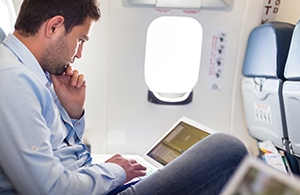TECHNOLOGY
Consider taking a few extra accessories when working offsite.
Working while on the road, whether at nearby job sites or when travelling to distant locations, usually means taking a smartphone, laptop or tablet.
The ability to work almost anywhere in the world is marvellous; however, when we are working at a hotel, jobsite, vendor or client location, or even at the cottage, we often wish we had the same conveniences we have at home.
Before taking your next trip, you may wish to consider adding a few of these travel essentials to ensure that, if your makeshift workstation is more like your home office, you will be less fraught with concern about your ability to complete the project.
Productivity
- For many, typing on the touch screens or keyboards provided on smartphones or laptops is inefficient and tiresome. Why not invest in a rechargeable portable keyboard that can be folded and placed into your briefcase? (Cost: approximately $20)
- If you find your laptop’s built-in touchpad or pointing stick frustrating to use, try a miniature (travel-sized) wireless or USB mouse to make dragging and dropping a lot easier. (Cost: approximately $10)
- Check your devices and determine what kind of battery they use. If any of your devices use separate disposable batteries, always ensure you have some spare AA or AAA batteries in the event your wireless keyboard or mouse dies at an inopportune moment. (Cost: approximately $2-5)
- If you frequently need to enter numbers on the go, punching one number at a time into the top row on a laptop can be frustrating. An external USB numeric keypad will make this task go faster, be more efficient and less frustrating than one-finger typing. (Cost: approximately $10)
Always carry extra USB sticks to create backups or share data.
Communication and Storage
- When you are on the road, Internet connectivity may not always be available, and even when it is available, there can be restrictions such as speed or port limitations. Before heading out on your trip, make sure you have copies of all the necessary files with you. Do not rely on the Internet to back up to the cloud or to transfer data to your office computer. Always carry one or two extra USB sticks to create backups or share data. Always check the USB stick for viruses after it has been plugged into any other computer. (Cost: approximately $10)
- If you are using Skype or another video or audio conferencing app, have a high-quality set of headphones with a microphone to provide some confidentiality when addressing private issues. If possible, find a model that is compatible with all your devices, including your computer, mobile phone and tablet. (Cost: approximately $30)
Ready for Business
- If you travel out of the office with any frequency, keep a dedicated power adaptor in your bag or briefcase. Grabbing your briefcase and heading out to a job site only to find that your battery is low and you have left the power cable at the office is not a good way to start a meeting or presentation. (Cost: approximately $50-100)
- Changes in technology have created situations where devices are not always compatible with each other. It is best to have dongles to make sure you are covered for the most common ports that may not be built into your computer or device, such as VGA, HDMI and Ethernet. (Cost: approximately $20-30)
- Older buildings were never designed to accommodate the proliferation of modern electronic needs and thus may not have electrical outlets close enough to be reached by your plug-in adapter. Consider a two-metre (six-foot) extension cord as part of your emergency kit. (Cost: approximately $5)
- You would never think of plugging your laptop into a wall socket at the office without using a surge protector; yet, every time you plug in at another location, you are undoubtedly not using one. Perhaps it is time to carry a small and affordable wall-mount surge protector that will not only protect your computer or other device, but can also be used as a USB charging station. Quality surge protectors have swivel mounts to allow more adaptability, LEDs that verify the unit is working and provide surge suppression, low clamping voltage, shutdown technology, and EMI/RFI noise reduction. (Cost: approximately $15)
- Many new vehicles have built in USB ports that allow you to plug in adapters to charge or run your devices. For vehicles that do not come with built-in USB charging ports, you can still take advantage of this “free” power source with a converter that steps down the 12 Volt output to the input voltage required by your device. Newer adapters will allow up to 4 USB plug-ins to allow additional units to be used or charged. (Cost: approximately $30)
- If your vehicle does not already have a power outlet, you can plug a power inverter into the cigarette-lighter port to convert the 12 volt DC power into a 120 watt AC outlet like the standard electrical outlets you have at home and at the office. You can operate and charge your computer, or any other electronics using the standard plug without having to buy vehicle adaptors for each device. Read the specs or go online to ensure output amperage is compatible with the more sensitive devices being charged through the USB port. The downside of these units is that your vehicle battery will run down quickly unless the vehicle is running all the time. (Cost: approximately $60)
Start Filling Your Shopping Cart
The list of available technology to make life more bearable when you are working out of the office is almost endless. Putting together a travel kit of practical, inexpensive electronics can turn a potentially non-productive day filled with frustration and anxiety into a productive and successful venture — all for the low, low price of about $420.
Contact Argento CPA today!
Source: BUSINESS MATTERS
Disclaimer: BUSINESS MATTERS deals with a number of complex issues in a concise manner; it is recommended that accounting, legal or other appropriate professional advice should be sought before acting upon any of the information contained therein.
Although every reasonable effort has been made to ensure the accuracy of the information contained in this letter, no individual or organization involved in either the preparation or distribution of this letter accepts any contractual, tortious, or any other form of liability for its contents or for any consequences arising from its use.
BUSINESS MATTERS is prepared bimonthly by the Chartered Professional Accountants of Canada for the clients of its members.
Richard Fulcher, CPA, CA – Author; Patricia Adamson, M.A., M.I.St. – CPA Canada Editor.
Contact us: patricia@adamsonwriters.ca


